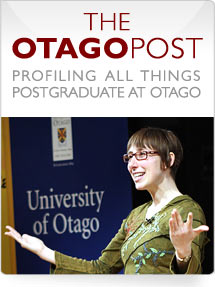 Thursday 24 September 2015 4:17pmThe Otago Post issue 9
Thursday 24 September 2015 4:17pmThe Otago Post issue 9
Finalists in the University of Otago's 2011 Supervisor of the Year Awards
A good student-supervisor relationship can make a huge difference to a student's postgraduate experience and, ultimately, influence their success. The contribution made by Otago's outstanding supervisors is recognized annually at the OUSA Supervisor of the Year Awards, and this year saw a record crop of nominations from the student cohort.
From the 101 academic staff nominated from across the university a student committee selected a shortlist of fourteen. The overall winner was Dr Tara Duncan, from the Department of Tourism, while the winner of the New Supervisor of the Year award was Dr Karen Bronéus from the Centre for Peace and Conflict Studies.
Dr Duncan believes successful supervisors require several important skill sets.
“It's important to understand the student's situation, viewpoint and their quandaries; have an interest in their subject and in them, both now and their futures; and communicate well, whether this be about how long feedback is going to take or about how the student-supervisor relationship is going.
She adds that it's also important to “support them through the process, through times when the personal may interfere with the PhD, and respect their decisions about their research whilst also trying to guide them to achieve the best possible outcomes. It's like solving a puzzle but it's not my puzzle so I have to ask questions, promote, suggest, push and then stand back as they solve it.”
Dr Duncan adds that supervising research students is “a big part of the job in terms of the importance I place on it” and both she and Dr Brounéus agree supervising is one of the best parts of their job.
“I enjoy seeing my students grow in their critical thinking and scholarly work, in sharpening their analytical eye, and in finding their voice in writing,” says Dr Brounéus. “They broaden my knowledge base and I learn by reflecting with them on the challenges they encounter. I feel very fortunate also to have a fantastic mentor in Sweden who has been and continues to be an important role model for me in developing my own supervising philosophy. The essence of that philosophy is challenge and support – all in a respectful balance.”
